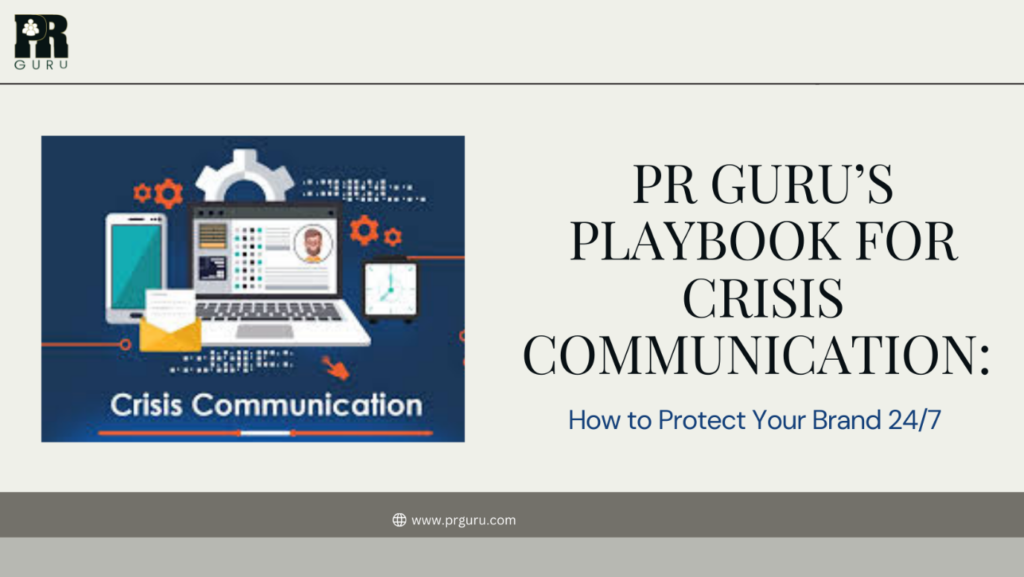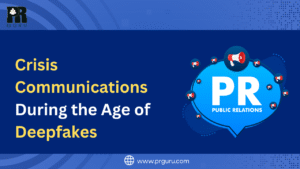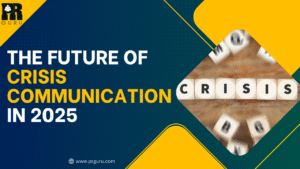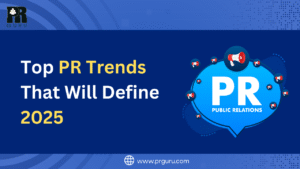PR Guru’s Playbook for Crisis Communication: How to Protect Your Brand 24/7
PR Guru: The Experts in Crisis Communication & Reputation Management
By PR-Team | April 7, 2025 | Reputation Management

Imagine waking up to a storm of alerts—your company is in the news, but not for any positive reason. A customer complaint has gone viral, a rival has made a sensational accusation, or a misunderstood marketing campaign is being publicly decried. Within hours, years of reputation-building could be undone if the situation is not handled well.
In this interconnected age, where social media never rests and public perception changes overnight, crisis communications are no longer a PR function—but a business imperative. What the brand does at those pivotal moments can send it into a period of lasting harm or make it emerge stronger than ever.
A well-prepared brand doesn’t just survive a crisis; it uses strategic communication to turn setbacks into opportunities. In this playbook, we’ll explore proven crisis communication strategies that can safeguard your brand’s reputation around the clock.
1. Crisis Prevention Starts with 24/7 Monitoring

The most effective way of crisis management? Avoid letting the crisis get out of hand in the first place. Early warning is the key to damage control, and that’s where real-time monitoring comes in.
Today in the digital world, your brand is being discussed every second of the day—on social media, in news articles, on blogs, and even in private forums. Without a strong monitoring system in place, negative buzz can spread like wildfire before you know it.
Business leaders use AI-based sentiment analysis technology, social monitoring tools, and real-time media monitoring to stay ahead. Companies can preempt small issues from developing into full-blown crises by watching online dialogue, identifying patterns, and detecting warning signs online.
Once you possess the right tools, you master the story before the story masters you.
2. Quick, clear communication is non-negotiable
When crisis hits, silence is not golden—it’s hazardous. Companies that are sluggish in responding or make default, corporate-speak statements are known to fuel cynicism among people. Consumers nowadays crave honesty, responsibility, and openness.
Currently of crisis, the first thing that the brand must do:
- Acknowledge instantly, even when not all the facts are at hand.
- Be honest and avoid making vague and defensive statements.
- Show action and describe what is being done to fix the problem.
Above all, make your response human. People trust people, not nameless corporations. A message that is perceived as sincere, compassionate, and solution-focused is much more powerful than a scripted press release.
The brands that address crises with openness, responsibility, and a proactive mindset bounce back quicker and gain long-term consumer trust.
3. AI & Data-Driven Crisis Management: The Future of PR

The role of technology in crisis communication is no longer an option—it’s mandatory. AI-powered tools and predictive analytics are revolutionizing the manner in which brands tackle crises, using real-time feedback, sentiment tracking, and data-driven decision-making.
AI can help PR teams:
- Detect negative trends before they escalate, allowing brands to act preemptively.
- Analyze public sentiment, shaping an effective and appropriate response.
- Model crisis scenarios, enabling businesses to refine strategies in advance.
In 2025, the brands that use AI and machine learning as part of their crisis communication strategies will be those that stay one step ahead of looming disasters. The digital age demands faster, smarter, and more considerate crisis management—AI makes that possible.
4. Influencer & Stakeholder Management: A New Age Crisis Strategy
Since social media influencers have such a strong hold on public perception, brands must reconsider their crisis communication strategy. Strategic partnerships with influencers have the potential to shape and control the narrative during a crisis.
Those with strong credibility and engaged viewers can boost the brand message, combat disinformation, and rebuild trust. To execute this strategy effectively, though, brands must:
- Build authentic, long-term influencer partnerships instead of just buying crisis-driven advocacy.
- Support steady, authentic messaging over scripted, overly promotional content.
- Actively engage critical stakeholders like employees, partners, and loyal customers who can become brand advocates.
A crisis is not about defending the media—it’s about rebuilding public trust. Leveraging influencers, industry influencers, and key stakeholders can be a game-changer in crisis communications.
5. Adaptability: The Keys to Survival Under Crisis Communication

No crisis ever plays out twice in the same manner. Rigid, inflexible response protocols that dismiss evolving conditions end up failing more often than not. Brilliant brands don’t so much have a crisis playbook—rather, they know how to pivot, transform, and get their strategies adjusted in real time.
Adaptability involves:
- Tracking public opinion every step of the way and adjusting messaging for it.
- Ready to rescript response plans as fresh information arrives.
- Learning from past crises and finessing strategies in order to prevent future threats.
A company’s ability to remain agile and responsive determines how it can better ride out volatile situations. The faster a company adapts to changing dynamics, the stronger its reputation in the long run.
PR Guru: The Experts in Crisis Communication & Reputation Management
When a crisis hits, knowing what to say—and when to say it—can make or break a brand. That’s where PR Guru steps in.
As a leading public relations agency, PR Guru provides guidance in crisis communication, reputation management, and media strategy. Whether it’s dealing with intense media attention, deflecting social media attacks, or restoring consumer confidence, PR Guru ensures that brands are in control of their narrative no matter the crisis.
From real-time crisis response tactics to proactive reputation-boosting strategies, PR Guru helps companies through even the most severe PR crises. With PR Guru at your back, your brand is always protected—24/7.
Final Thoughts
In an overnight reputation-changing world, crisis communication is no longer merely about damage control—it’s about future-proofing your brand. Businesses that invest in:
- Proactive listening and live responses
- Open and honest communication
- AI-powered insights for data-driven decision-making
- Strategic influencer and stakeholder alliances
- Adaptable, agile crisis management practices
…are those that turn setbacks into comebacks.
No company is crisis-proof—but with proper strategies, any crisis is an opportunity to expand. Be prepared, be resilient, and let PR Guru be your trusted partner in safeguarding your brand reputation.
Is your brand crisis-proof? Contact PR Guru today and build a reputation that can survive any storm.
Also Read: Crisis Management: Essential Steps to Safeguard and Strengthen Your Brand’s Image
Ready to take your PR strategy into 2025 and beyond? Visit PRGuru.in to find out how we can partner together to make your brand unforgettable.
Build authority, trust, and engagement with the right PR moves! Follow PR Guru on LinkedIn for expert tips, success stories, and industry trends








